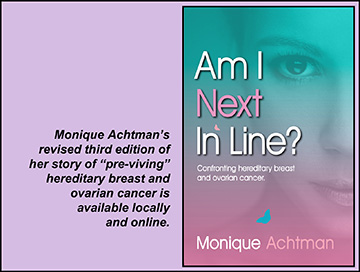Angelina and reader share response to hereditary cancer
COFFEE WITH WARREN, with Warren Harbeck
Cochrane Eagle, May 22, 2013

One week ago actress/director Angelina Jolie drew international attention to hereditary breast and ovarian cancer. A prime candidate for such cancers, she announced publicly in a New York Times Op-Ed piece (May 14) that she, too, carries the faulty BRCA1 gene and therefore had recently undergone a preventive double mastectomy.
Angelina shared her story, she said, in the hope that others can benefit from her experience.
That is precisely why one of our longtime coffee companions, Monique Achtman, has shared her own confrontation with hereditary breast and ovarian cancer in her important book, Am I Next In Line?, now into its third (revised) edition.
I asked Monique for her opinion on Angelina’s decision.
“Angelina's story has initiated lots of discussion and learning about hereditary breast and ovarian cancer,” she responded. It’s so important “that the awareness is growing, and more and more people are discussing hereditary cancer and genetics/family health history.”
Monique, a Calgary-based writer/editor and frequent visitor to Cochrane coffee shops, first published her own journey of awareness and response to having the BRCA1 gene mutation eight years ago. (See my column of April 6, 2005.)
Aware of the multi-generational history of cancer in her family – both her grandmother and mother, who died at age 39, had been diagnosed with these cancers before the age of 40 – she had undergone gene testing. Like Angelina, she learned that she too ran a very high risk of developing such cancers.
In Monique’s case, she said, she “had up to an 85 per cent risk of developing breast cancer and 65 per cent risk of ovarian cancer in her lifetime.” Preventive surgery could reduce the risk to three per cent or less.
With the support of her husband, Myron, she opted for surgery and regards herself now as a “cancer pre-vivor.”
By sharing her story so publicly, Monique has given support to Angelina’s hopes for doing the same. Indeed, members of Monique’s own family, at first hesitant about this whole matter, have undergone life-saving medical testing and made courageous choices of their own.
“A strong motivation for us was the fact that we had to live for our children, and for ourselves!” she says.
“I can tell you that the best thing I ever learned in my life was that through my family genealogy interest and family loss, health is the most important gift we have.
“Learning about the scientific findings of the BRCA gene mutations has saved several lives in our family already; and with this information and sharing of personal stories, I believe many more lives will be saved. And here, I'm thinking especially about saving the lives of people under age 50 who are otherwise faced with a genetic predisposition to an early cancer diagnosis due to a mutation to a specific gene.”
Monique is quick to agree with critics, such as medical commentator H. Gilbert Welch, who caution that the faulty BRCA1 gene affects only about one per cent of the population. However, she counters, the risk is even higher in certain ethnic groups, such as Icelandic, French Canadian and Ashkenazi Jewish, Monique’s own background.
Nor are men exempt from BRCA gene mutation risks: higher lifetime risk for prostate cancer and male breast cancer, as well as a 50 per cent chance of passing the gene mutation on to their children.
Gene testing “is not an option for everyone,” she says. Nevertheless, for that one per cent for whom it is appropriate, “the preventive options can be absolutely life-saving.”
“It's not just a woman's issue,” she says. “It is truly a family matter.”
Am I Next In Line? is available locally at Bentleys Books, or directly from Monique (aminextinline.com). Monique is also available as a speaker on this vital issue.
© 2013 Warren Harbeck
JoinMe@coffeewithwarren.com